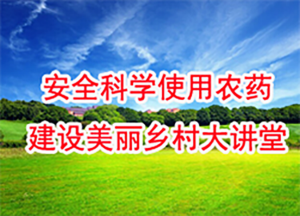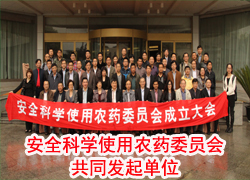
CCPIA to Set up Ten Branches
責(zé)任編輯:Cong Lv 來源:China Crop Protection Industry Association 日期:2014-06-25
At the Fourth Session of the Ninth Executive Committee, China Crop Protection Industry Association (CCPIA) put forward the proposal of setting up ten branches, which was greatly supported by the representatives of the Executive Committee. Below is a brief introduction to the ten branches and their functions:
I. CCPIA Professional Committee for Public Health Pesticide
1. Research development policies, strategies and planning for the industry, and provide services to the government in the preparation of industry development planning and policies;
2. Reflect the development situation of the industry and enterprise demands, and protect the rights and interests of public health pesticide enterprises;
3. Coordinate and integrate technological resources, promote technological innovation, guide the industry to strengthen its independent innovation ability, promote advanced key technology and enhance the technological and research & development level of the industry;
4. Guide and regulate market behaviors, maintain a fair market, strengthen enterprise self-discipline, and promote orderly competition;
5. Set up a technical and information communication platform and recommend Chinese public health products to the world.
II. CCPIA Professional Committee for Non-crop Agrochemicals
1. Policy support and coordination: actively consult with MOA and MIIT to speed up the issuance of relevant policies, and actively offer support and help in projects, funds and taxation;
2. Encourage innovation: encourage technological innovation and pesticide use innovation and the expansion of the field of application;
3. Gradually formulate relevant access standard or regulation to provide a rule basis for the management of non-crop agrochemicals;
4. Promote new pesticide technologies and new varieties in non-crop fields.
III. CCPIA Committee for International Trading
1. Invite and receive foreign pesticide trade delegations; organize member enterprises to pay a visit or an inspection tour abroad, and develop exchange and cooperation with relevant international organizations, regional organizations, trade promotion organizations, chambers of commerce, associations and embassies in China;
2. To better expand the overseas market, organize Chinese pesticide trade delegations to hold pesticide trade exhibitions overseas every year;
3. Provide overseas customer information services for member enterprises;
4. Organize the communication among pesticide supporting enterprises, and hold technical and information exchange meetings on logistics, packaging, banking and insurance periodically for pesticide import and export supporting enterprises;
5. Provide legal consulting services on the disputes of intellectual property;
6. Organize members to actively participate in the “credit rating of the Chinese pesticide industry” organized by CCPIA under the authorization of the Ministry of Commerce;
7. Formulate market regulations for pesticide import and export enterprises;
8. Organize relevant meetings on the import and export trade of pesticides;
9. Invite experts to train member enterprises on the domestic and international pesticide registration procedures, the pesticide markets and the laws of relevant countries;
10. Under the leadership of CCPIA, communicate with relevant government departments with respect to pesticide import and export matters, reflect enterprise demands, strive for import and export policies favorable to the pesticide industry.
IV. CCPIA Committee for Using Pesticide Safely and Scientifically
1. Cooperate with NATESC and local governments, set up a training platform for safe and scientific pesticide use, and hold comprehensive, large-scale training sessions on safe and scientific pesticide use from time to time;
2. Improve the enterprise training system on safe and scientific pesticide use, and cultivate professional trainers on safe and scientific pesticide use;
3. Gradually establish a pesticide packaging waste recycling mechanism, and explore and improve pesticide packaging waste recycling models to solve pesticide packaging waste problems in rural areas;
4. Foster a good company image with social responsibility and care among farmers;
5. Promote new pesticide use technologies and new pesticide varieties.
V. CCPIA Professional Committee for Pesticide Adjuvants
1. Gradually set up pesticide adjuvant standard to make it easier to regulate the industry;
2. Cooperate with MOA in pesticide adjuvant management, and offer advice to management departments to improve the policies on pesticide adjuvants;
3. Integrate the advantages of professional committees and hold the communication meetings promoting the communication between pesticide adjuvant research centers and production enterprises;
4. According to the requirements of the Limit Standards of Harmful Solvents in EC Formulations, carry out relevant technical work, adjust the usage of harmful solvents in agricultural surfactants and solvent products, sort out and adjust the formula of EC formulations, and promote a batch of product formulas that can be taken by pesticide manufacturers for reference;
5. Organize technical communication among the member enterprises of the Committee to improve the technical and production level of the member enterprises.
VI. CCPIA Professional Committee for Pesticide Packaging
1. Gradually establish pesticide packaging standard, and based on the current agricultural packaging market, draft some standards and apply to a higher body for approval;
2. Cooperate with MOA in the pesticide packaging management work, and make national management policies serve enterprise development;
3. Hold communication meetings promoting the communication between the Committee and the formulators, and do well in the training on the use of pesticide packaging and of pesticide packaging equipments;
4. Do well in the technical communication among the member enterprises of the Committee.
VII. CCPIA Professional Committee for Pesticide Processing Facilities
1. Gradually set up pesticide processing equipment and application regulations;
2. Do well in the training work on the operation of pesticide processing equipments and promote the application of advanced equipments in the pesticide industry;
3. Organize to hold communication meetings promoting the communication between the Committee and the formulators;
4. Do well in the technical communication among the member enterprises of the Committee.
VIII. Alliance for China Pesticide Industry Stewardship
1. Conduct research on basic work for stewardship, organize the research on stewardship evaluation index system and evaluation methods, and establish stewardship evaluation and authentication mechanism;
2. Organize and carry out stewardship publicity, research & discussion and special-subject training;
3. Organize and carry out communication, inspection and visit activities;
4. Actively strive for the policy support on stewardship from relevant government departments;
5. Develop international cooperation, learn information about the stewardship activities carried out by relevant international organizations, and organize communication and cooperation with international organizations and companies.
IX. CCPIA Technology Center for Pesticide Engineering
1. Design and demonstrate pesticide formulation factories, workshops and equipments;
2. Set up a pesticide formulation processing engineering team, and improve formulation processing equipment level as well as the quality level of formulations;
3. Gather relevant talents in pesticide synthesis process development and engineering research, cultivate a batch of high-level engineering technology and management talents, and set up a synthesis engineering technology platform of the pesticide industry for cleaner production and process optimization of pesticide synthesis;
4. Provide open service, undertake engineering technology research, design and experiment tasks assigned by governmental organs, institutions of higher education, scientific research institutions or enterprises.
X. CCPIA Alliance for Pesticide E-Commerce
1. Conduct enterprise communication, explore development model, avoid constraints in pesticide e-commerce, and gradually break through bottleneck and adapt to the new development trend of the industry;
2. Gradually set up a pesticide e-commerce trading platform, guide enterprises to develop e-commerce through the Alliance, shorten the marketing channel, and establish the most convenient trading approach for pesticide enterprises, pesticide dealers and users;
3. Do well in the internal communication work among the member enterprises of the Alliance, and solve the problems in the development using the development experiences of the member enterprises for reference.
Currently, CCPIA Committee for International Trading, CCPIA Committee for Using Pesticide Safely and Scientifically, CCPIA Professional Committee for Pesticide Adjuvants, CCPIA Professional Committee for Pesticide Packaging and CCPIA Technology Center for Pesticide Engineering have already been established, and the rest five are in their later preparation stage.
中國農(nóng)藥工業(yè)網(wǎng) 版權(quán)所有
地址:北京市朝陽區(qū)農(nóng)展館南里通廣大廈7層
電話:010-84885233 京公網(wǎng)安備11010502025163










